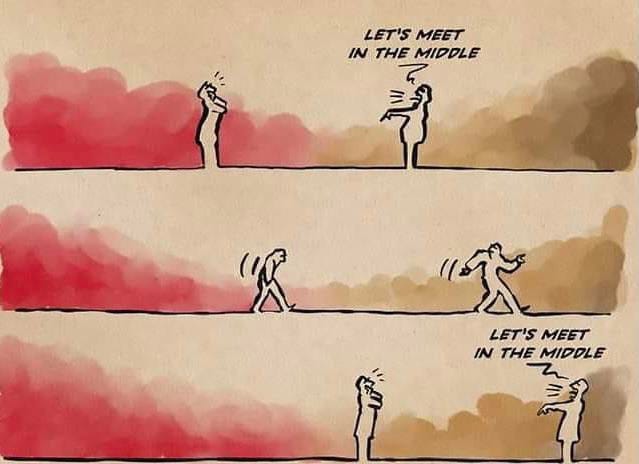Should people be able to talk about politics at work?
Of course the answer is yes, but companies are struggling with how to do it
Sree’s newsletter is produced w/ Zach Peterson (@zachprague).
Scroll down for Read Something; Watch Something; and a weekly tech tip from Robert S. Anthony (@newyorkbob).
Tickets are on sale for my fully-online conference, Social Media Weekend 2021 (#SMWKND). Join us in May 21-22! Makes a great gift for Mother’s Day or for a recent grad - or anyone else.
TUNE IN: #NYTReadalong - this week we’re going back to our roots! Producer Neil Parekh and I will read the NYT—really read the NYT. Join us live at 8:30 am ET, or later.
My Digimentors team is working with companies and nonprofits around the world to create virtual and hybrid events. We’ve worked on events for 50 people and 100,000 people. See our new brochure. Don’t cancel or postpone your conference - contact us! sree@sree.net
***
Basecamp is a company that a lot of people probably were not too familiar with before this week. The company’s main product is a planning software that is sort of like a combination of task planning like Asana and communication like Slack, and is popular with developers especially.
This week, the company lost nearly a third of its employees—some quite senior—after a change in internal policy regarding “societal and political discussions” on internal channels. The backlash came quite quickly.
Here is an excerpt from Basecamp Founder and CEO Jason Fried’s memo:
No more societal and political discussions on our company Basecamp account. Today's social and political waters are especially choppy. Sensitivities are at 11, and every discussion remotely related to politics, advocacy, or society at large quickly spins away from pleasant. You shouldn't have to wonder if staying out of it means you're complicit, or wading into it means you're a target. These are difficult enough waters to navigate in life, but significantly more so at work. It's become too much. It's a major distraction. It saps our energy, and redirects our dialog towards dark places. It's not healthy, it hasn't served us well. And we're done with it on our company Basecamp account where the work happens. People can take the conversations with willing co-workers to Signal, Whatsapp, or even a personal Basecamp account, but it can't happen where the work happens anymore.
For two decades, we’ve heard tech leaders, including the heads of Basecamp, espouse the benefits of the open workplace. People are people, even at work, they said. They espoused open cultures, free discussion, and open-mindedness among coworkers. But, as many of them have shown over the more recent past, they simply are unable to put their stated openness to practice. The Basecamp situation is no different, and the leadership’s explanations amount to little more than a cop-out.
The passage I quoted above is the perfect example of something I discussed in last week’s Sunday Note about the limits of the word “political” as an adjective. Sure, discussions of issues like racism, immigration, etc, are tough ones to have, but couching it in phrases like, “Sensitivities are at 11, and every discussion remotely related to politics, advocacy, or society at large quickly spins away from pleasant,” is simply lazy and does nothing but diminish the very real concerns and issues that many Basecamp employees were raising in internal message boards.
This all started at Basecamp with a years-old internal list of “funny names”—a fact neither Fried nor fellow Basecamp exec David Heinemeier Hansson mention in their posts. Casey Newton interviewed Hansson last week and got a bit more on the “funny names” list, and…wow.
In a response to Hansson’s post [eds: about the list], one employee noted that the way we treat names — especially foreign names — is deeply connected to social and racial hierarchies. Just a few weeks earlier, eight people had been killed in a shooting spree in Atlanta. Six of the victims were women of Asian descent, and their names had sometimes been mangled in press reports. (The Asian American Journalists Association responded by issuing a pronunciation guide.) The point was that dehumanizing behavior begins with very small actions, and it did not seem like too much to ask Basecamp’s founders to acknowledge that.
Hansson’s response to this employee took aback many of the workers I spoke with. He dug through old chat logs to find a time when the employee in question participated in a discussion about a customer with a funny-sounding name. Hansson posted the message — visible to the entire company — and dismissed the substance of the employee’s complaint.
Not too tough to see where and why things started to unravel.
The broader issue of the discussions companies allow on internal channels is not going away any time soon, and this is an abject lesson in what not to do. Executives and managers in literally every industry are dealing with this every day, and it’s not easy, especially in larger organizations. My advice: Let the people talk, let things get heated, and hold regular group sessions to talk about these things. Then, schedule activities that have literally nothing to do with work at all, and involve everyone you can.
The way to let people—all of whom are adults, remember—connect more personally is to do team building things that are 100% divorced from the everyday grind. Sharing common humanity in-person is powerful, and will be very possible again very soon. Take advantage of this.
Most importantly, do not do what Basecamp did. The people who work for you are people, and expecting them to interact with their colleagues for somewhere between 8-12 hours every day and just “stick to work” is both unreasonable and patronizing. More importantly, if your company talks about its values and its commitments to society and diversity externally, it follows that you are going to have a few uncomfortable conversations internally. It’s pretty silly to take the moral high ground in your marketing materials and then not let your own employees talk about the meaning of the moral high ground on the company Slack channel.
- Sree
Social Media Weekend 2021 #smwknd is fully online on May 21-22 (Friday evening in NYC and all-day Saturday). You can watch live or later as we share tips and advice on all things social and digital. We have all-star speakers who will help us navigate the digital world this year and beyond. See details.
Join us for:
25+ speakers
2 keynotes
2 roundtable discussions
12+ short talks, panels, workshops,
20+ hours of learning
WATCH LIVE OR LATER
For sponsor info and more, contact Executive Producer Linda Bernstein, VP of Education, Digimentors (linda@digimentors.group).
Read Something
Private accounts, sharing with close friends only, disappearing messages - they are all part of reducing the “social” aspect of social media. I don’t see this trend going away any time soon, and I wouldn’t be surprised if the next new social network is somehow focused on sharing with just close friend groups.


The Road Back to Normal Runs Through Las Vegas
By Robert S. Anthony
Each week, veteran tech journalist Robert S. Anthony shares a tech tip you don’t want to miss. Follow him @newyorkbob.
If you’re wondering where we are on the road back to having real-person, handshaking, elbow-bumping tech events again, you need only look as far as Las Vegas. The Consumer Technology Association announced last week that CES, the consumer electronics mega-event that drew 170,000 attendees to Las Vegas in 2020 but went all-virtual for 2021, would be returning in January 2022—but as a hybrid event with both real and online components.
The announcement elicited both cheers and jeers from tech journalists: Some can’t wait to touch new gadgets and talk to people face-to-face again, while others griped about already-inflating hotel prices and wondered what health-protection policies would be in effect.
The fact that CES 2022, still eight months out, has already been designated hybrid is an indicator that while we’re well on the road to ending the Covid-19 pandemic, confidence in events that draw international attendees isn’t here yet.
The cancellation or delay of major tech shows due to the pandemic has thrown scheduling new-product announcements—which often coincide with tech shows—completely off-kilter, leading some gadget makers to wonder whether such events should be in their futures at all.
Mobile World Congress, which focuses on mobile communications, is moving forward as a hybrid event in Barcelona this June. While MWC succeeded in getting the Spanish government to allow registered MWC attendees to enter the country for the show, some past exhibitors like Nokia, Sony, Facebook and Google have already declined to attend.
MWC, which attracted 109,000 attendees in 2019, will include virtual booth tours and small “virtual specialist networking workshops” of up to 20 people to give remote attendees a more personal experience.
The CTA, which said more than a thousand exhibitors had already committed to participating in CES 2022 in Las Vegas, said the show would retain the virtual “anchor desk” which connected remote attendees with exhibitors and other online features in the all-virtual CES 2021.
Even a scaled-down CES is a godsend to the Las Vegas Convention Center, which had completed a massive expansion in anticipation of CES 2021 only to watch the gleaming, vast new spaces sit empty due to the pandemic.
As CES veterans know, hope springs eternal in Las Vegas—but can disappear as quickly as it takes to roll a pair of dice. Will the future of tech shows come up snake eyes? We’ll know soon enough.
Listen to Something
Words matter, and this episode of the On the Media podcast does a great job of illuminating exactly what that means. The Basecamp story above is a great example of how things like someone having a “funny” name can be particularly harmful to a broad swathe of people, and we realize that now more than ever and I would argue that it’s a good thing. Listen here or on any major podcast platform.
Watch Something
The Covid crisis in India is destroying lives, and there seems to be little relief in sight—at least in the near-term. Facebook and Twitter are censoring content critical of the government response, people are dying, and the head of the Covid vaccine program in the country has fled due to threats on his life. We tried to unpack as much as we could this week on my show. Many thanks to Vandana Menon in Hyderabad and Vijayta Lalwani in Delhi. Presented with Scroll.in and SAJA, the South Asian Journalists Association (SAJA Board Member John Laxmi joined us to ask some questions).
Odds & Ends
🗞 TUNE IN: #NYTReadalong - our guest this week is Neil Parekh, 8:30 am ET, live or later.
Tickets are on sale for Social Media Weekend 2021 (#SMWKND) - sign up and take advantage of our early bird rate! Join us in May!
The Readalong is followed, on Sundays at 11 am-noon ET, by a new medical show I’m co-executive producing with surgeons Sujana Chandrasekhar, M.D. (@DrSujanaENT), and Marina Kurian, M.D. (@MarinaKurian), called She’s On Call (watch live or later).
After 250 episodes in 250 days, my global show has moved from daily episodes to 1-2 times a week. The best way to know when I’m on the air and see all my archived shows, is to subscribe to my YouTube channel or my Whatsapp alerts.
The Sunday #NYTReadalong is sponsored by Muck Rack. Interested in sponsorship opportunities? Email sree@digimentors.group and neil@digimentors.group.
🎧 Every Saturday, I host a call-in show on WBAI 99.5FM (@wbai) - "Coping with Covid19" - focused on being helpful, hopeful, and focusing on the pandemic's effects on society’s most vulnerable. Listen live Saturdays from 12-1pm ET, or later. And, of course, call in or tweet questions for us using the #wbaisree hashtag. Listen to a recent episode here!
👀 Did we miss anything? Make a mistake? Do you have an idea for anything we’re up to? Let us know! Let’s collaborate!







